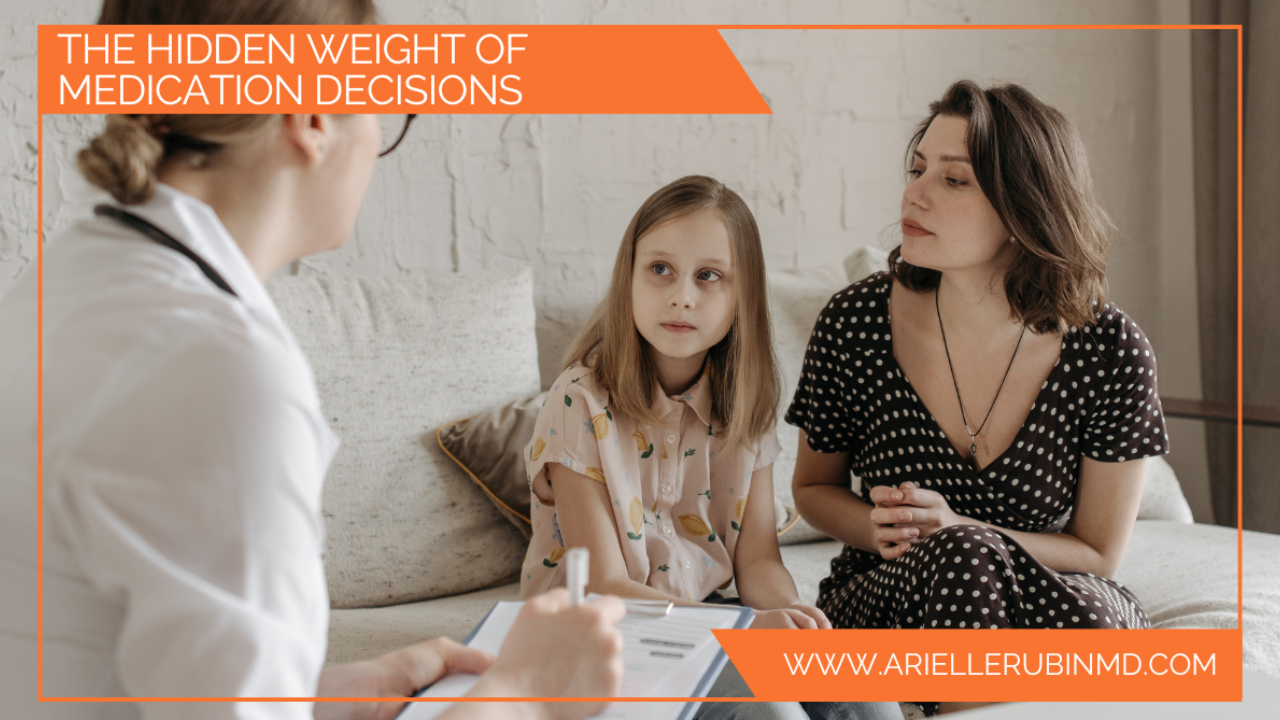The Hidden Weight of Medical Decisions
Dec 11, 2025
Making the Medication Decision: What No One Tells You About the Emotions Parents Carry
Meta Description:
Starting a child on psychiatric medication is one of the hardest decisions many parents will ever make. Here's what families wish they knew before — and how medication transformed their children's lives.
There’s a kind of heartbreak no one warns you about — the kind that shows up when you're sitting at your kitchen table, prescription in hand, wondering if you're doing the right thing for your child.
For so many parents of autistic and neurodivergent kids, the decision to try a psychiatric medication — especially something like an atypical antipsychotic — is anything but simple. It often comes after months (or years) of escalating behaviors, sleepless nights, and deep concern for your child’s safety — and your family’s ability to function.
One parent recently shared:
“We’ve made the decision to start our son on an atypical antipsychotic after some increasing aggression and self-injurious behavior… I’m hopeful this will help him finally enjoy summer like other kids do… But starting him on a medicine like this was a hard decision, and I’m a nervous wreck. I feel like every decision is life or death.”
If this resonates with you — you're not alone. So many families I work with know exactly what that moment feels like.
The Emotional Weight of “Doing the Right Thing”
There’s a particular kind of decision fatigue that builds up when you've tried everything else. When therapy alone isn’t enough. When your child is hurting themselves, or others. When your home doesn’t feel safe anymore.
You start Googling side effects. Reading every Reddit thread. Talking to friends (some supportive, others not). And then there's the voice inside your head asking: Is this too much? Am I giving up? Will they ever be the same again?
Another parent reflected:
“I remember giving [my son] risperidone before bed and I was just sick. I cried and cried. I thought I’d poisoned him. He was 7. I was terrified he wouldn’t wake up the next morning.”
These are the moments no one prepares you for — when love, fear, guilt, and hope all sit in the same room.
And Then Something Shifts
But here’s what many parents say they wish they’d known sooner:
Sometimes medication isn’t about changing who your child is. It’s about unlocking who they are.
That same parent continued:
“He did wake up. And it was like I met the real him for the first time. The aggression — gone. It felt like a dream. We got our life back.”
For some kids, finding the right medication gives them the space to regulate, to connect, to be themselves without the weight of constant dysregulation. And for some families, it means finally being able to eat a meal together, go outside without fear, or just breathe.
The Trial-and-Error is Real — But So Is the Hope
Medication isn’t magic. And what works beautifully for one child might not work for another. Side effects can show up. Things may need to be adjusted. There’s often trial and error.
“Risperidone worked great at first for both my boys,” another parent shared. “But over time, one developed tics and we had to switch. Rexulti ended up being the sweet spot for my youngest. Every change was hard, but we found our way.”
What matters most is having the support and guidance to keep going — to keep adjusting — and to trust that your child deserves to feel safe in their body and mind. And so do you.
What Parents Learn Along the Way
Many families find that over time, their kids actually begin to understand their own regulation better:
“Now my sons are older, they’ll tell me, ‘something’s off.’ They know what calm feels like now. They wouldn’t have without the meds. They would’ve thought agitation and chaos were normal.”
This kind of insight — this capacity to know what regulated feels like — can be life-changing. And it’s one of the most powerful gifts medication can offer.
To the Parent Who’s Still on the Fence
If you’re standing at that edge, holding a new prescription and a whole lot of fear — this is for you.
You’re not weak. You’re not giving up. You’re being brave in a way only a parent can be.
You’re making a decision that might just change everything.
There are no perfect paths. But there are families — so many of them — who’ve walked this road before you and are now standing on the other side saying:
“It’s okay. You’re not alone. It can get better.”
Looking for others walking this road?
➡️ Join our community of parents and professionals rethinking mental health care for autistic individuals. Share your story, ask questions, and access support from people who truly get it.
[Join the Community →] (link to your platform or signup page)
Get notified when new blogs are posted and get exclusive insights by joining my weekly newsletter!

